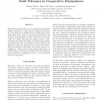Free Online Productivity Tools
i2Speak
i2Symbol
i2OCR
iTex2Img
iWeb2Print
iWeb2Shot
i2Type
iPdf2Split
iPdf2Merge
i2Bopomofo
i2Arabic
i2Style
i2Image
i2PDF
iLatex2Rtf
Sci2ools
ICRA
2002
IEEE
2002
IEEE
Fault Tolerance in Cooperative Manipulators
The problem of fault tolerance in cooperative manipulators rigidly connected to a solid object is addressed in this paper. Four faults are considered: free-swinging joint faults, locked joint faults, incorrect measured joint position, and incorrect measured joint velocity. The faults are first detected by a fault detection and isolation system. Freeswinging and locked joint faults are isolated using artificial neural networks. The other faults are isolated based on the kinematic constraints imposed on the cooperative system. After the isolation of the faults, the control system is reconfigured. Control laws for the system with passive or locked joints are developed. Results of the fault tolerance system applied in simulations and in a real cooperative system are presented.
Related Content
| Added | 15 Jul 2010 |
| Updated | 15 Jul 2010 |
| Type | Conference |
| Year | 2002 |
| Where | ICRA |
| Authors | Renato Tinós, Marco H. Terra, Marcel Bergerman |
Comments (0)

